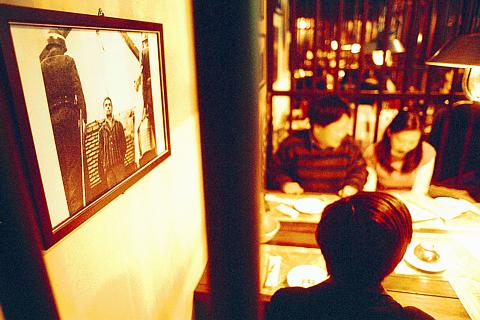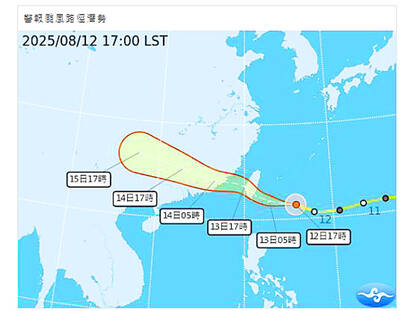Most customers who come to one of Taipei's newest theme restaurants, The Jail (
What many may not notice, especially now, is that mixed in among the chains, barbed wire, handcuffs and the eatery's distinctively "restrictive" atmosphere are a number of images hung on the walls that are strikingly familiar -- and very offensive to some people.
Gracing the walls of the restaurant, along with traditional prison pictures, are photos of Nazi concentration camps, as well as a mural depicting women, men and children standing behind a prison camp's barbed wire fence.

PHOTOS: CHEN CHENG-CHANG,TAIPEI TIMES
Even more provocative for some is a "Gas Chamber" sign hanging over the entrance to the restrooms.
The restaurant's manager, Stone Cheng (
"If there really is stuff here that makes people uncomfortable, then we will do what we can to change that," Cheng said.
And yesterday, Cheng did just that, packing up the pictures and painting over the "Gas Chamber" sign and removing a large wall mural.
Cheng said he never expected such a response, and didn't even know what was hanging on his walls until it was pointed out to him.
"We've brought together a lot of things -- a group canteen, individual cells and a VIP cell, all kinds of things, just for fun," he said. "We never thought this could have negative connotations for foreigners."
Pointing to the "Gas Chamber" sign, Cheng tried to explain why the sign was put over the restroom entrance, which has open pipes.
"We say jokingly that the bathroom is a place where noxious air collects, so we called it a `gas chamber,'" he said.
Some messages, however, need little explanation.
In one of the cells, a picture of the entrance to a concentration camp hangs on the wall. The words on a prison gate in the picture read "Arbeit Macht Frei" or "Work Brings Freedom," the same sign that greeted Jewish prisoners who went to the camps during the World War II. Nearby is another picture of an emaciated concentration camp inmate who stands in the foreground, his ribs protruding, while others huddle on bunks behind him.
Cheng was not the only one who was impervious to the meaning of the surroundings. Sitting in one of the cells, a group of Taipei twenty-somethings are commenting about The Jail's interior design. None mentions the pictures on the wall.
"The decorations here are really interesting," says one diner. "I've never been to jail, so I thought I would give it a try."
Behind the push to have the items taken down was the local representative of the Israel Economic and Cultural Trade Office, Uri Gutman.
Gutman visited the restaurant several times over the past two days and has been impressed by the owners positive response.
"They were totally embarrassed and willing to do everything," Gutman said.
Rather than create a fuss over the incident, which Gutman calls "borderline," he hoped the mistake would be educational.
"It seems like it's more a case of ignorance," Gutman said. "This is not anti-Semitism, it's a lack of understanding."
German Trade Office Director General, Hilmar Kaht, who hadn't been to the restaurant, said he couldn't understand why anyone would want to go there.
"I don't know why people would want to go to a restaurant with a prison theme and have their rights read to them and get handcuffed. I don't understand it, perhaps it's sadomasochism," Kaht said.
Over the past few years, several pop cultural phenomena involving Nazi paraphernalia have cropped up in Taipei, including people wearing motorcycle helmets with Nazi decals and other Nazi imagery being used in connection with various consumer products.
Last November, the Israeli Economic and Cultural Trade Office and the German Trade Office had to step in and protest when a local electrical company used a cartoon caricature of Adolf Hitler in advertisements in store windows and subway stations throughout the city to promote a German-made space heater.
The company, K.E. and Kingstone, said it had decided to use Hitler to emphasize that the heaters were made in Germany. After the local Jewish and German communities protested, the matter was resolved and the company removed its ads.
At least in the case of The Jail, the owner of the restaurant has demonstrated cultural sensitivity, Gutman said.
However, when and where another case will crop up again is unclear. As Gutman put it, "sometimes these things are in the hands of the decorators."

GET TO SAFETY: Authorities were scrambling to evacuate nearly 700 people in Hualien County to prepare for overflow from a natural dam formed by a previous typhoon Typhoon Podul yesterday intensified and accelerated as it neared Taiwan, with the impact expected to be felt overnight, the Central Weather Administration (CWA) said, while the Directorate-General of Personnel Administration announced that schools and government offices in most areas of southern and eastern Taiwan would be closed today. The affected regions are Tainan, Kaohsiung and Chiayi City, and Yunlin, Chiayi, Pingtung, Hualien and Taitung counties, as well as the outlying Penghu County. As of 10pm last night, the storm was about 370km east-southeast of Taitung County, moving west-northwest at 27kph, CWA data showed. With a radius of 120km, Podul is carrying maximum sustained

Tropical Storm Podul strengthened into a typhoon at 8pm yesterday, the Central Weather Administration (CWA) said, with a sea warning to be issued late last night or early this morning. As of 8pm, the typhoon was 1,020km east of Oluanpi (鵝鑾鼻), Taiwan’s southernmost tip, moving west at 23kph. The storm carried maximum sustained winds of 119kph and gusts reaching 155kph, the CWA said. Based on the tropical storm’s trajectory, a land warning could be issued any time from midday today, it added. CWA forecaster Chang Chun-yao (張竣堯) said Podul is a fast-moving storm that is forecast to bring its heaviest rainfall and strongest

TRAJECTORY: The severe tropical storm is predicted to be closest to Taiwan on Wednesday and Thursday, and would influence the nation to varying degrees, a forecaster said The Central Weather Administration (CWA) yesterday said it would likely issue a sea warning for Tropical Storm Podul tomorrow morning and a land warning that evening at the earliest. CWA forecaster Lin Ting-yi (林定宜) said the severe tropical storm is predicted to be closest to Taiwan on Wednesday and Thursday. As of 2pm yesterday, the storm was moving west at 21kph and packing sustained winds of 108kph and gusts of up to 136.8kph, the CWA said. Lin said that the tropical storm was about 1,710km east of Oluanpi (鵝鑾鼻), Taiwan’s southernmost tip, with two possible trajectories over the next one

TALKS CONTINUE: Although an agreement has not been reached with Washington, lowering the tariff from 32 percent to 20 percent is still progress, the vice premier said Taiwan would strive for a better US tariff rate in negotiations, with the goal being not just lowering the current 20-percent tariff rate, but also securing an exemption from tariff stacking, Vice Premier Cheng Li-chiun (鄭麗君) said yesterday. Cheng made the remarks at a news conference at the Executive Yuan explaining the new US tariffs and the government’s plans for supporting affected industries. US President Donald Trump on July 31 announced a new tariff rate of 20 percent on Taiwan’s exports to the US starting on Thursday last week, and the Office of Trade Negotiations on Friday confirmed that it